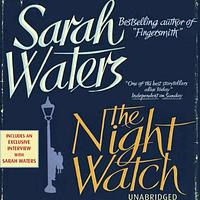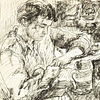Take a photo of a barcode or cover
I hate that I didn't care for this, as I've liked all of the other books of hers I've read so far! Thos was just boring. I didn't like any of the characters. I didn't care about them, or about what happened to them. I would not have finished it except I kept thinking it would get better because it's Sarah Waters. The abortion scene was quite well done and bumped this up to two stars for me, but even it had this feeling of disconnect because you know she survives, and continues to see the horrid man!!! It just makes you dislike her even more. Duncan's story was particularly dissatisfying as the idea of a conscientious objector in WWII, the war in which we most hail soldiers and hate dissenters, was intriguing, but dear god his story was boring. Overall quite disappointing.
This novel moves slowly back in time from 1947 to 1941, telling a bit of the story and then eventually revealing what happened. I enjoyed seeing how the relationships between the characters formed and changed, and learning only later how they'd met, or what had happened to precipitate someone's action.
This is Waters' first novel set in the 40s, and it is a welcome change: the perversity of her fascination for Victorians can get tiring after a while. Despite being set in London around WWII, her attitude towards the period feels more grounded. Wartime brings the hidden horrors of past generations to the surface, and so rather than focus on the heightened yet archetypal experience of soldiers she illuminates the suffering of everyday civilians. The collective traumas of war constantly intertwine with the trauma of individuals, just as public secrets compound upon private ones: a bomb causes a woman to be impaled by railings in the street not long after a character’s womb is ruptured in an illegal abortion, someone is chastised for loudly naming landmarks in a public park in case a spy overhears while a lesbian quietly complains to her lover that she is being too obvious about their relationship.
The novel ultimately doesn't reach the same complexity as Fingersmith but as a result it doesn't feel quite as thorny either (there is a creeping feeling of unscrupulousness to her first three novels that I still don't entirely know what to do with). Waters is often praised for restoring lesbians to their rightful place in history and literature, for being “good representation”. But of course her real project is much more complex: what The Night Watch’s layers of public and private suffering make clear is that her interest lies in exploring how people’s sense of morality is shaped by the times they live in. And while in her Victorian fiction this can often result in a kind of nihilism, The Night Watch softens this a bit, with characters that reflect more readily on their desire to be (and their idea of) what a “good person” is. I appreciate that she was able to do this without placing modern frameworks on the characters, and I left feeling that the novel was a refreshing alternative to the a-historicism that seems so pervasive these days.
The plot also unfolds backward beautifully, each section further intertwining the characters’ relationships with each other. This aspect of her plotting feels charmingly queer: among lesbians, there are no coincidences, everybody just already knows everybody else (though I will say the melodrama of the character Helen was the least compelling aspect of the novel). I also found it an appropriate approach for characters impacted by war, in the beginning section the unknowable-ness of traumatic memories was reflected in both the characters, who don’t know how to process the past, and the reader, who doesn’t have access to it yet.
I desperately needed to get absorbed in a novel again and this was just the thing. Can't believe this book has been sitting unread on my shelf for so many years, but I'm glad I waited until now because it has helped me stumble through a few very cold, very depressing days.
The novel ultimately doesn't reach the same complexity as Fingersmith but as a result it doesn't feel quite as thorny either (there is a creeping feeling of unscrupulousness to her first three novels that I still don't entirely know what to do with). Waters is often praised for restoring lesbians to their rightful place in history and literature, for being “good representation”. But of course her real project is much more complex: what The Night Watch’s layers of public and private suffering make clear is that her interest lies in exploring how people’s sense of morality is shaped by the times they live in. And while in her Victorian fiction this can often result in a kind of nihilism, The Night Watch softens this a bit, with characters that reflect more readily on their desire to be (and their idea of) what a “good person” is. I appreciate that she was able to do this without placing modern frameworks on the characters, and I left feeling that the novel was a refreshing alternative to the a-historicism that seems so pervasive these days.
The plot also unfolds backward beautifully, each section further intertwining the characters’ relationships with each other. This aspect of her plotting feels charmingly queer: among lesbians, there are no coincidences, everybody just already knows everybody else (though I will say the melodrama of the character Helen was the least compelling aspect of the novel). I also found it an appropriate approach for characters impacted by war, in the beginning section the unknowable-ness of traumatic memories was reflected in both the characters, who don’t know how to process the past, and the reader, who doesn’t have access to it yet.
I desperately needed to get absorbed in a novel again and this was just the thing. Can't believe this book has been sitting unread on my shelf for so many years, but I'm glad I waited until now because it has helped me stumble through a few very cold, very depressing days.
In der ersten Hälfte habe ich vor Langeweile mehrmals darüber nachgedacht, die Lektüre abzubrechen. Ich habe nur weitergelesen, weil ich vorher so viele Leseproben durchprobiert hatte und mich nicht wieder auf die Suche machen wollte. In dem Abschnitt, der 1947 spielt und das erste Drittel des (nicht kurzen) Buchs einnimmt, passiert so gut wie gar nichts: Menschen gehen durch London, sind eifersüchtig, trinken Tee, rauchen Zigaretten, und das alles sehr, sehr ausführlich. In der zweiten Hälfte wurde es besser. Die Erzählreihenfolge (zuerst das Jahr 1947, dann die Vorgeschichte von 1944, dann die Vor-Vorgeschichte von 1941) macht es interessanter. Zu meiner Freude wurden viele Handlungsfäden, bei denen ich eine naheliegende Erklärung erwartet habe, stattdessen offen gelassen.
Mein Problem war wohl, dass die Figuren nach dem Krieg ein vergleichsweise langweiliges Leben führen und die Geschichte damit beginnt. Als ich fertig war, habe ich noch mal den Anfang angesehen, und jetzt interessierte mich auch der langweilige Teil. Umgekehrt hätte man die Geschichte aber auch nicht besser erzählen können, weil dann auf einen halbwegs ereignisreichen ersten Teil eine sehr lange und öde Coda folgen würde, ohne irgendeine befriedigende Auflösung. Als Darstellung von Nachkriegsproblemen ist diese Erzählstruktur schon genau richtig. Aber wenn man noch nie was von Sarah Waters gelesen hat, vielleicht besser nicht gerade hiermit anfangen.
Mein Problem war wohl, dass die Figuren nach dem Krieg ein vergleichsweise langweiliges Leben führen und die Geschichte damit beginnt. Als ich fertig war, habe ich noch mal den Anfang angesehen, und jetzt interessierte mich auch der langweilige Teil. Umgekehrt hätte man die Geschichte aber auch nicht besser erzählen können, weil dann auf einen halbwegs ereignisreichen ersten Teil eine sehr lange und öde Coda folgen würde, ohne irgendeine befriedigende Auflösung. Als Darstellung von Nachkriegsproblemen ist diese Erzählstruktur schon genau richtig. Aber wenn man noch nie was von Sarah Waters gelesen hat, vielleicht besser nicht gerade hiermit anfangen.
GREAT story telling and, after more than three weeks of pandemic fears/limited attention span, I think this might have got me me back into reading.
I didn’t know what to expect going into this one, but it was so much better than what I could have ever imagined. This book has a wide range of unlikable characters who do a lot of shitty things I could never agree with, which is exactly what made this story so interesting to read. I love the choice of telling it in a reverse chronological order, I love how I had to work my way through the book to find out how things came to be and why these people are the way they are. The images of world during war and the descriptions of the bombings and the destruction were truly soul crushing and added so much depth to this book too. This was my first Sarah Waters novel, but it definitely won’t be the last one.
Slow start because of the structure of the book, but I ended up loving the backward telling of the story in the end.
An average of 3,7/5 sounds about right. Sarah Waters is excellent at writing characters and their relationships as always but some of the bombing scenes dragged out way too long.
This book wasn’t quite what I was expecting, but I thoroughly enjoyed it. It made for a quite intriguing read as the timeline in the story is backwards during the 1940s during WWII. It kind of made me want to start from the end and work my way to the beginning when I was done reading- but alas, my TBR is huge so maybe another time.








